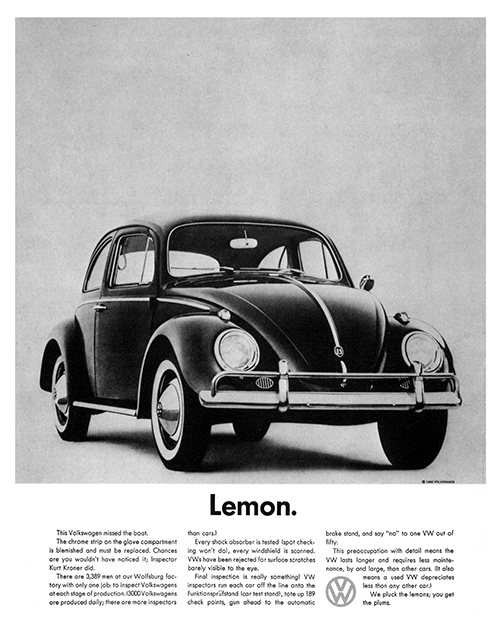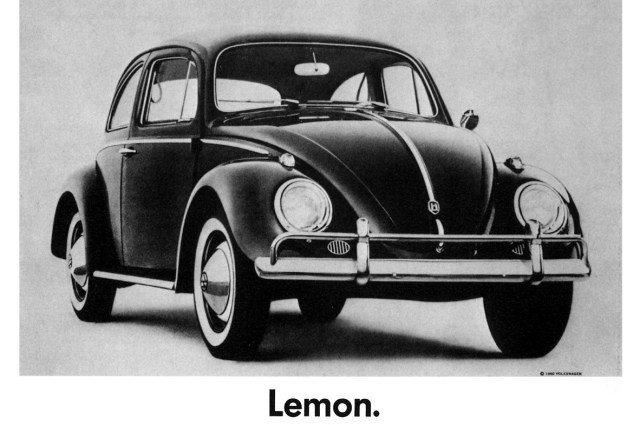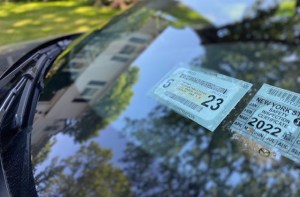We’ve all wondered where particular phrases or sayings come from, but more often than not, the task of learning its origins gets kicked down the road.
Well, good news – we’ve reached the end of the road and the answers are upon us. We’ve gone the extra mile to dig up the backstory of some common idioms and expressions. And because we have a particular affinity for a certain four-wheeled vehicle, we narrowed our search accordingly.
Let’s take a Sunday drive through a list of commonly used car idioms and expressions and figure out how they came to be.
Backseat Driver
Before this term became an unflattering label for an unhelpful passenger, it was a literal description for someone driving from the back seat, like you see in tiller fire trucks.
Get the Show on the Road
Now used whenever you want to get things moving (literally or figuratively), the phrase developed in the early 1900s as a reference to traveling circuses or other entertainment acts.
Grease Monkey
The term we now use as a pejorative for a mechanic likely dates all the way back to Great Britain’s Industrial Revolution. Back then, children were used to grease steam engine axles. Crawling and hanging on large machinery while covered in grease earned them the primatal nickname.
Jalopy
This term for an old, rundown car is likely derived from the name of Xalapa, Mexico (or Jalapa). In the early 1900s, the U.S. commonly shipped old cars to the Mexican city, where they were refurbished and resold, or scrapped.
Kick the Tires
Stumped on this one? You’re not alone. The Chicago Tribune asked the tire experts at Goodyear, and even they weren’t definitive. They did, however, provide several possible theories:
- When cars and horses shared the road back in the day, unlucky passersby would kick vehicle tires to get manure off their shoes. When motorists saw this, they thought it was a manner of checking the condition of their tires.
- Truck drivers used to test their tires’ air pressure by striking them with a tire billy.
- The car idiom is derived from the Latin phrase, “E tira kikium,” meaning “a kick for good luck.”
Lemon 
In early British and American slang, “lemon” was used to describe a hustle or passing off a sub-standard item as a superior one. The idea being that despite looking shiny and new, you’ll be left with a pained, puckered look once you dig a little deeper.
Over time, defective cars began earning the lemon label. The connection was solidified in the 1960s thanks to a famous Volkswagen ad. Discussing its rigorous safety testing, the carmaker included a photo of one vehicle that didn’t pass inspection. The headline simply read: Lemon. Nowadays, the term is used in the law books.
Pedal to the Metal
We all know the meaning of this phrase, but it wasn’t devised by racecar drivers or speed demons. Instead, the credit belongs to truckers. An article in the July 1976 issue of Popular Mechanics includes “pedal to the mettle” in a list of popular CB radio lingo.
Riding Shotgun
The term for sitting in the front passenger seat dates back to the days of stagecoaches. A passenger would often sit next to the driver with a shotgun in hand to protect what they were transporting. Riding shotgun is most closely associated with the Wild West, but the term wasn’t commonly used during that time. The connection was formed later on when the phrase became commonplace in Western movies and television shows.
Rubberneck
The word rubbernecking traces its roots back to the 1890s. At that time, however, it was not a reference to the unsafe practice of gawking at a car crash. Originally, “rubberneck” was used to describe tourists, especially those on sightseeing tours who would stretch their necks out for a better view of the surroundings.
Car idioms are just the start. From car washes to stop signs, learn about the backstories of all aspects of the automotive world on our Auto History page.
16 Thoughts on “The Origins of Popular Car Idioms and Expressions”
Leave A Comment
Comments are subject to moderation and may or may not be published at the editor’s discretion. Only comments that are relevant to the article and add value to the Your AAA community will be considered. Comments may be edited for clarity and length.














The writer of this article made a small mistake. He/she called the Lemon ad “infamous,” which means “evil” or “disgraceful.”
Nothing could be further from the truth. This ad was produced by the Doyle Dane Bernbach ad agency and was one of the first examples of the “creative revolution” in advertising that took place in the 1960s. Up to that point, automobile advertising tended to be overly glamorous, with fireworks and bikini-clad models extolling the car’s virtues. DDB decided to change all that and go simple. Hence, the “lemon” ad.
Now, when you see a car maker calling its own product a lemon, obviously you’re going to think, “How can they be disparaging their own product?” The answer lies in the copy: “The chrome strip on the glove compartment is blemished and must be replaced.” This demonstrates Volkswagen’s attention to detail when it comes to quality control. Then you get the joke, and see what a good company they are.
So, your editor really should have said “famous.” That’s because in the halls of advertising fame, this ad certainly is.
Hi Jim, great point – thanks for calling that out and for your insightful comment. We’ve made the edit. 🙂
Lemons became associated with inferior products due to the “one-armed bandits”, or slot machines used by gamblers. You put in a coin and pulled the lever, and three wheels with pictures of various fruits or other objects would spin. If they stopped on certain combinations of pictures, you would win money. There was no winning combination that started with a lemon in the first position, so if the first wheel stopped there, the gambler would yell “It’s a lemon!” and throw another coin in without waiting for the other two wheels to stop. Over the years, “It’s a lemon” became code for something that’s just no good. (source: GAMES magazine)
The comment about “Pedal to the Metal” cannot be correct because my mother, who was known for driving very fast, especially on long trips often used the term “pedal to the Metal” so that she could “Clean out the jets” as in carburetor jets, back in the mid to late 1960’s which was long before the credit given to the 1976 popular mechanics article about CB Trucker slang!
Larry, your right about that, I remember when I was younger it was always big stuff to clear out the jets!
My father told me that when buying a car, you would kick the tires to make sure they weren’t filled with sand to make it appear it was full of air. Keeps them honest!!!
I remember pedel to the when I was a kid way before CB radios were popular. I’m in my 70s. “Tire Kicker” is now used a derogatory term someone trying to look they know sometking about cars but doesn’t. Tires with sand in should shake like crazy and how would you fill them completely? More often than not automotive technicians don’t like the term grease monkey because they feel it’s degrading because it has a very low knowledge and skill level indication.
The term “rubbernecking” as applied to car drivers was coined by one of the first helicopter traffic reporters in the New York City area, Fred Feldman.
A grease monkey referred to the mechanic who worked in a grease pit changing engine oil and greasing suspension fittings, rather than by elevating the car to access lubricant fittings.
Kicking the tires was probably a way to determine if the tires were inflated. Now with radials, tires look under inflated by design.
I had read a long time ago that kicking the tires on a prospective car purchase was because the sidewalls on early tires were very thin. If you kicked them to test the quality of the tire to see if it would get a blow out. Not sure if that is true but that is what I had read.
The term “gapper block” is commonly used on traffic reports to describe a traffic blockage caused by rubbernecking. Is the origin of this term known?
The term I’ve heard is Gawker Blocker, but could also be Gaper or even Gawper Blocker. “Gawk”, “gape” and “gawp” all mean “to stare at”. I’ve heard “gawker blocker” on traffic reports in the Boston area (Gahkablahka!) coined by clever WEEI traffic reporter Kevin O’Keefe to describe a slowdown caused by drivers gawking at an accident or other distraction on the other side of the highway.
See this definition: https://en.wiktionary.org/wiki/gapers%27_block#English
More Kevin O’Keefe terms:
Gahkablahka
Traffic tie-up caused by people looking at an accident on the other side of the road (or sometimes at excessively enthusiastic human billboards). Only in Boston could you get “gawker” and “blocker” to rhyme. Coined by long-time WEEI traffic reporter Kevin O’Keefe, who also came up with “stall ‘n’ crawl,” “cram ‘n’ jam” and “snail trail.”
You can add to those from Kevin O’Keefe sayings, creep and beep, stuck truck and busted bus.
“Monkey” was used for someone small, agile, and running errands long before anybody was applying grease; my ancient copy of the OED traces “powder monkey” (someone dodging artillery crews to bring gunpowder from cramped stores to the gun deck of a fighting ship) to 1682. The term has also been carried forward; see the song “Code Monkey”.
I studied Latin for several years in school. “E tira kikium” doesn’t sound like any Latin I know, and Google Translate agrees with me. I think Goodyear (or the Chicago Tribune) was having you on.